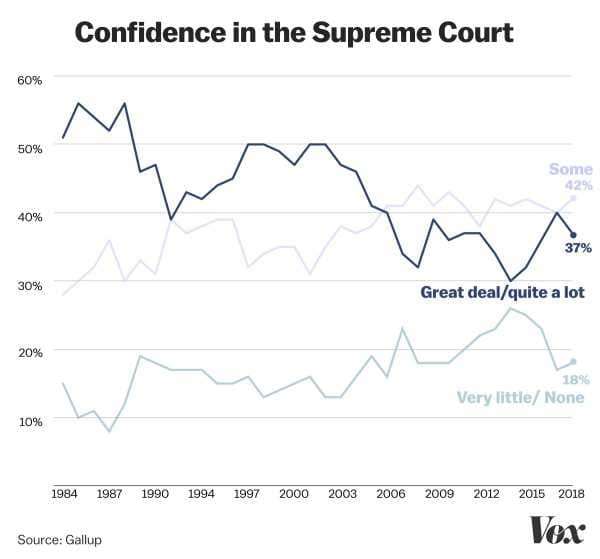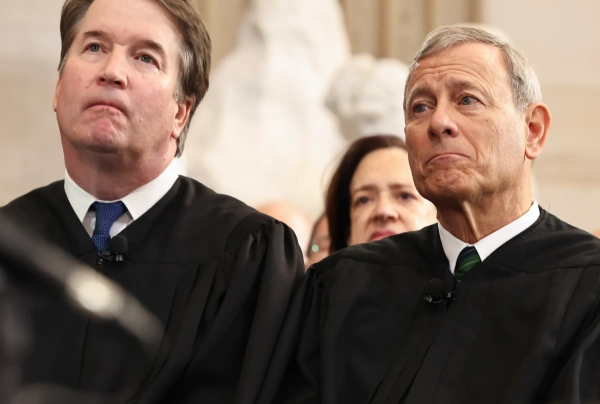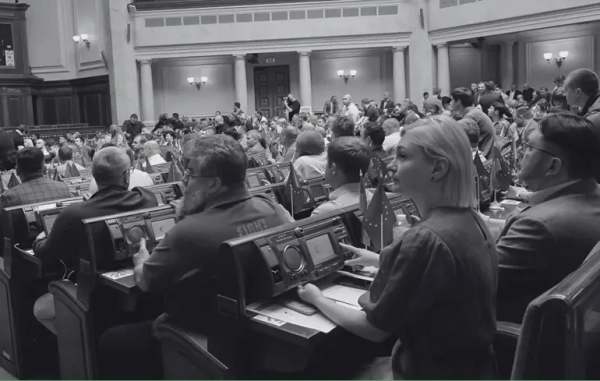
By engineering the confirmation of Brett Kavanaugh to the Supreme Court, Senate Majority Leader Mitch McConnell has won a tremendous partisan victory — but at the cost of tremendous damage to the Court itself.
The Supreme Court’s legitimacy depends on most Americans viewing it as above the partisan fray, an institution whose decisions are driven by legal reasoning, not by the justices’ partisan leanings.
In confirming Kavanaugh, with a razor-thin partisan majority no less, the Republican Senate may well end up eroding that public faith. Kavanaugh’s fiery and nakedly partisan testimony in front of the Senate Judiciary Committee during the September 27 hearing revealed a justice who was less an “impartial arbiter” of the law and more a partisan creature who would take his political grudges to the Supreme Court.
In that hearing, he blamed the sexual assault allegations against him on a left-wing conspiracy: a “calculated and orchestrated political hit, fueled with apparent pent-up anger about President Trump and the 2016 election.” He claimed, without evidence, that Democrats were going after him to get “revenge on behalf of the Clintons,” with the support of “millions of dollars in money from outside, left-wing opposition groups.” He was defiant, even downright rude, toward the Democratic senators who asked him questions — interrupting Sen. Amy Klobuchar, whose father is in recovery from alcohol addiction, to ask if she had ever blacked out from overconsumption.
His performance was so alarming that the American Bar Association, which had given him its stamp of approval, on Friday announced that it was reopening its evaluation of Kavanaugh in light of his “temperament.” Retired Justice John Paul Stevens was also taken aback, saying Kavanaugh’s performance revealed a “potential bias” that could be a problem. And more than 2,400 law professors signed a letter expressing their view that Kavanaugh “did not display the impartiality and judicial temperament” to sit on the Court.
Kavanaugh seems to have sensed that his performance may have been damaging: He wrote an op-ed that appeared Thursday in the Wall Street Journal acknowledging that he was “too emotional at times” during the hearing, and asserting that he “will keep an open mind in every case.”
But his partisan testimony was consistent with a career spent in the Republican trenches against Democrats: He worked for Ken Starr’s investigation into the Monica Lewinsky scandal, and then for President George W. Bush after that. Now he becomes the conservative majority’s fifth vote after a bitter confirmation battle and an FBI investigation that Democrats believe was a whitewash. He joins the Supreme Court trailed by allegations of sexual assault (which he has denied) and accusations from some liberals that he lied under oath.
The system depends on everyone having faith in the Supreme Court adjudicating partisan disputes; confirming Kavanaugh, who is the most unpopular Supreme Court nominee ever to be approved by the Senate, could theoretically collapse this consensus.
The Kavanaugh confirmation fight “directly links the Court to the direct political process,” says Michael Nelson, a professor at Penn State. “That’s the sort of thing that’s kryptonite for the Court.”
The Court’s legitimacy problem
When scholars talk about the Supreme Court’s “legitimacy,” they are talking about something more fundamental than job approval or whether the public agrees with the Court’s ruling in a specific case. They’re talking about the people’s faith in the very idea of the Supreme Court: the notion that it should be the final arbiter on political questions, the ultimate interpreter of the Constitution, insulated from partisanship and politics.
This kind of basic faith in the Court’s mission is essential to its functioning. Liberal democracy is, in theory, premised on the idea that you can only govern with the consent of the governed. There’s an inherent tension between this vision and unelected judges setting law through rulings, one resolved only if the public believes that the Court is a legitimate decision-making body.
A 2005 Annenberg survey found that the Supreme Court is significantly more trusted than the other two branches of the federal government, and that 75 percent of Americans believe “the Supreme Court can usually be trusted to make decisions that are right for the country as a whole.”
Much of that faith in the Court still endures. A 2018 Annenberg poll, for example, found that 73 percent of Americans disagreed with the idea that “if the Supreme Court started making a lot of rulings that most Americans disagreed with, it might be better to do away with the Court altogether.”
On other measures, however, public faith in the courts is in modest decline. An annual Gallup poll of public confidence in American institutions shows that the percentage of Americans who have a “great deal” or “quite a lot” of confidence in the Court has been mired in the 30s for much of the past decade; in the 1990s, that figure routinely reached the 40s and 50s:

Political scientists generally do not see this as evidence that the Court is losing fundamental legitimacy. While the public may be less happy with the Court’s performance, or possibly less likely to trust it to do the right thing, they still generally do not think its role in the system has been cast into immediate jeopardy.
“The way the literature sees it now, it would take a lot to shake people’s faith in the Court,” says Sara Benesh, an expert on the Court at the University of Wisconsin Milwaukee.
There’s a debate among scholars about whether a series of unpopular rulings alone could damage the Court’s legitimacy in the public’s eyes, and genuine uncertainty about just how insulated the Court is from public opinion. It could be the case that the Court’s legitimacy is relatively secure — or that it’s a few bad decisions away from collapsing, potentially precipitating a crisis in which political actors start to ignore Court decisions.
But whether or not academics think controversial decisions are enough to destroy faith in the Court, they agree that the ultimate issue in determining the Court’s legitimacy is whether it appears to be above politics. This appears to be part of the calculation behind Chief Justice John Roberts’s decision to uphold the Affordable Care Act: He was deeply worried about the Court being perceived as simply a partisan Republican actor.
“This is the real risk to the Court’s legitimacy,” Rebecca Gill, a political scientist at the University of Nevada Las Vegas, says of Kavanaugh’s confirmation. “It’s not the idea that the Court makes political decisions — it’s the idea that the Court is just another partisan institution.”
When the Court loses its legitimacy, it has concrete consequences. The Supreme Court has no way to actually enforce its edicts. It relies on compliance and enforcement from the other branches and local governments. If the public doesn’t broadly believe in the Court’s role in the system at a very basic level, political actors might be tempted to ignore it.
This has happened before. In 1832, President Andrew Jackson refused to implement Supreme Court rulings upholding the rights of the Cherokee tribe; after Brown v. Board of Education, Southern states employed “massive resistance” tactics to block Court-mandated desegregation. We could now be entering yet another period of crisis.
The liberal turn against the Court
Since 2016, Senate Majority Leader Mitch McConnell has used scorched-earth tactics to seize control of the Supreme Court. When Antonin Scalia died in 2016, McConnell infamously refused to even consider President Obama’s replacement nominee, Merrick Garland, until after the 2016 election. There was no principled rationale for this: The reason was that Garland is a moderate liberal and would have tipped the Court from a 5-4 conservative majority to a 5-4 liberal one.
McConnell got his way, of course, and then President Donald Trump appointed staunch conservative Neil Gorsuch to the Court instead of Garland. Now, longtime Republican operative Kavanaugh has been confirmed over heated liberal objections, which have not subsided (to say the least): 76 percent of Democrats believe Christine Blasey Ford’s allegations that Kavanaugh sexually assaulted her, according to a Marist poll released on October 3.
The sexual assault allegations were bad enough for the Court’s legitimacy on their own. But the tack Kavanaugh chose to employ defending them — blasting Democrats in an unprecedentedly partisan speech — will likely mar his reputation, and thus the Court.
“[The hearing] was ugly and partisan, which is exactly what could do damage to the institution,” Benesh tells me. “Pushing this nomination through after that cannot be positive for the Court.”
The increased polarization of American politics will make the hit to the Court’s legitimacy worse than even past events, like the Clarence Thomas-Anita Hill hearings or Bush v. Gore. Over the past several decades, the political parties have sorted into more unified liberal and conservative blocs. The decline of conservative Democrats and liberal Republicans, and the linking of partisan identity with social identities like race and religion, has made partisanship the most powerful force in American democracy.
The result has been an across-the-board decline in faith in neutral institutions. Everything is being seen through a polarized lens — not just the political branches but executive agencies and even federal law enforcement as well. There’s a growing trend in Americans identifying the quality of institutions with how well those institutions serve their partisan ends — a trend the Court has been (relatively) insulated from, but one that it’s likely to get looped into now.
Experimental evidence suggests this is a fairly plausible outcome. Boston University’s Dino Christenson and David Glick conducted an experiment that showed some people evidence that the Court’s ruling upholding Obamacare was politically motivated while withholding the same material from another group. The result: Conservatives who were given material showing that the ruling was political viewed the Court as significantly less legitimate compared to even other conservatives in the control group.
The more the Court becomes the center of partisan conflict, in short, the more people are likely to see it through a partisan lens. And that process is already happening, albeit in a somewhat unequal fashion: Democrats seem to be more likely to be skeptical of the Court than Republicans.
This stems from what legal scholars Joseph Fishkin and David Pozen call “asymmetric constitutional hardball”: the fact that Republicans have broken the informal rules of politics and constitutional practice far more than Democrats have in the past several decades.
The Merrick Garland saga is the most prominent example of this. It’s not the only one, but from my conversations with liberals, it appears to have been something of a breaking point. Republican senators blocking an Obama appointee, for obviously partisan reasons, convinced many Democrats that there are no impartial norms surrounding the Court.
Now you have Kavanaugh rammed through despite the cloud of sexual assault allegations, after an FBI investigation that Democrats (correctly) believe was too limited to help adjudicate the truth of the allegations against the now-justice.
The Supreme Court’s newest justice is a man who remains accused of sexual assault, nominated by a president who himself has been accused of several sexual assaults, to serve on a Court that already has a justice (Clarence Thomas) who has been accused of sexual harassment and, more recently, groping a female attorney at a dinner party. This, in and of itself, would likely damage the perception of the Court in the #MeToo era (at least among Democrats and people on the broader left).
But when you combine that with the fact that this Court could plausibly overturn Roe v. Wade in the coming years — the most cherished victory of the American feminist movement — you have yet another reason to worry about a Supreme Court legitimacy crisis.
Almost immediately after Kennedy announced his retirement, prominent liberals and leftists started calling for the next Democratic Congress to pack the Court — meaning expanding its membership from nine to 11 (or more) to create a new liberal majority. Kavanaugh on the Court, and the 5-4 rulings on charged topics that might ensue, will likely intensify such calls.
We are about to enter a new era in the Supreme Court’s life, one in which a significant portion of the population will view its decisions as fundamentally illegitimate. It’s part of the baleful legacy that Donald Trump and Mitch McConnell will leave us with us long after they’re gone.
Sourse: vox.com






